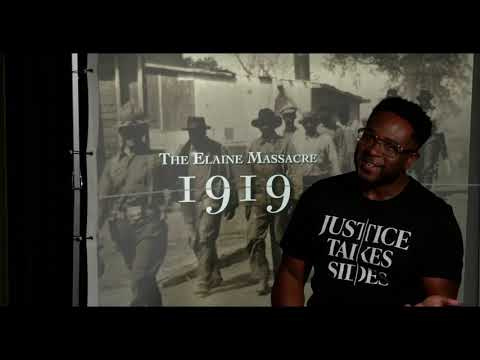From Elaine to Immigration: The Fight for Habeas Corpus Then and Now
How a 1923 Supreme Court case rooted in Black history warns us about the dangers of suspending due process today
You won’t find this kind of research often. One connecting present-day events with a very specific of rural, racial history. But this is part of my mission. If you want to support it, become a paid subscriber today.
In 1923, the Supreme Court handed down a decision that would change the trajectory of civil rights jurisprudence in the United States.
Moore v. Dempsey may not be widely known today, but it set a precedent that continues to echo in our legal and political debates—especially in light of recent statements by Stephen Miller and Kristi Noem advocating for the suspension of habeas corpus in the name of immigration enforcement.
Noem, the Secretary of Homeland Security, was questioned in a hearing before the U.S. House of Representatives.
Representative Eli Crane, a Republican, asked Noem if she thought migrants illegally crossing the U.S.-Mexico border qualified as a "rebellion or invasion" that could allow for the suspension of habeas corpus.
"I'm not a constitutional lawyer, but I believe it does," Noem said.
The Elaine Massacre
While these statements make national news headlines, this isn’t just a matter of legal theory for me.
I used to live in Phillips County, Arkansas—the origin of the Moore v. Dempsey case.
I lived in Helena, the county seat, where the very courthouse that hosted the original sham trials still stands.
Those trials were a direct outgrowth of the Elaine Massacre of 1919, one of the deadliest episodes of racial violence in American history.
WATCH- The Elaine Massacre: A Teach-In
If you’d like to learn more about the racial history of this nation, and you think teach-ins like this are valuable, then please consider becoming a paid subscriber. Thank you!
Hundreds of Black sharecroppers were murdered for organizing to demand fair payment.
In the aftermath, twelve Black men were sentenced to death after trials dominated by white mobs.
Their convictions were so egregiously unjust that the Supreme Court ruled federal courts could intervene—overturning state convictions on constitutional grounds.
This was historic.
Moore v. Dempsey marked the first time the Supreme Court used habeas corpus to protect the due process rights of Black defendants in state courts.
It cracked open the door for federal courts to act when local systems of justice had utterly failed—an essential precedent during the Civil Rights movement.
But this wasn’t the first time the Supreme Court was asked to intervene after mob violence influenced a conviction.
The Leo Frank Case
Nearly a decade earlier, in Georgia, Leo Frank—a Jewish factory superintendent—was convicted of murdering a young white girl in a case rife with anti-Semitic fervor and mob intimidation.
Like the Black men in Elaine, Frank wasn’t even present in the courtroom during critical parts of the appeals process due to safety concerns.
But the courts failed Frank.
The U.S. Supreme Court denied his appeal in Frank v. Mangum (1915), saying that state-level remedies hadn’t been exhausted.
Soon after, a mob abducted Frank from prison and lynched him.
The difference between Frank’s fate and the outcome in Moore reflects a shift in how the courts began to understand the stakes of mob justice and due process.
These were not abstract legal debates—they were matters of life and death for people pushed to the margins of society.
Protecting Habeas Corpus
So when Stephen Miller, Kristi Noem and others in the Trump administration call for the suspension of habeas corpus—which according to the Constitution is only allowed in cases of “rebellion or invasion”—we should hear the alarms of history ringing.
What this regime proposes is not simply a bureaucratic policy shift. It’s a threat to one of the oldest safeguards of individual liberty we have.
Habeas corpus is the legal bedrock that allows a person to challenge unlawful imprisonment.
This right is being challenged just as the Trump regime is enacting increasingly unconstitutional measures to abduct and rendition virtually anyone the claim is here illegally.
It has been a lifeline for the marginalized, especially when local courts bowed to public pressure, prejudice, or political agendas.
Without it, we risk repeating the darkest chapters of our legal history, where courts functioned less like forums of justice and more like tools of terror.
I think often of that courthouse in Helena.
Of the lives nearly lost but ultimately spared because the federal courts stepped in.
Of how that ruling set a legal foundation for future civil rights victories.
And of how fragile those gains become when political actors threaten to dismantle them under the guise of national security or law and order.
The story of Moore v. Dempsey is a story of resistance—legal resistance to racial violence and systemic injustice.
It reminds us that the courts can be sites of liberation, but only if we protect the principles that make justice possible in the first place.
P.S. Subscribe to this Substack so you can get updates on the forthcoming documentary film, Silent No More (Cherry Street Productions) which tells the story of the Elaine Massacre, its impact, and the Moore v. Dempsey court case.






This post offers another reason why we need to learn and teach history. We are certainly on the trajectory of repeating the worst parts of our history. It is also understandable why Republicans and white Christian nationalists want to hide history.
John 3:19b
“...people preferred darkness to light because their deeds were evil."
Thank you for helping connect threats today with tragic historical events. When addiction to power and hate overwhelms reason, law and love, humanity suffers.